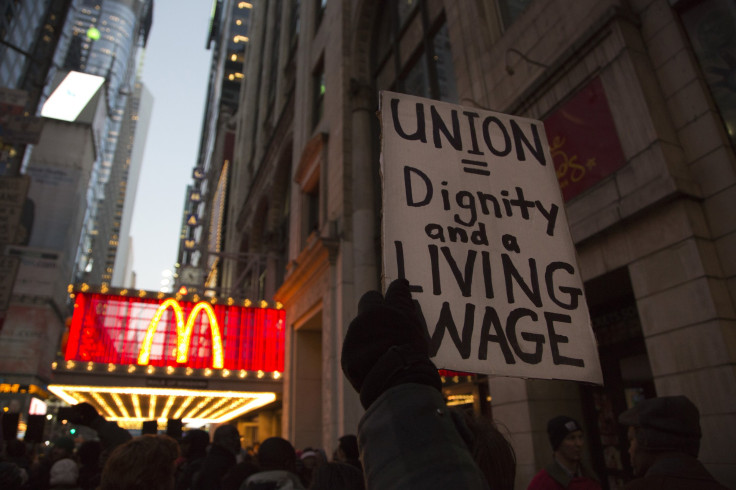Small Businesses Want A Higher US Minimum Wage

The debate over the federal minimum wage is scarcely a debate. President Barack Obama has proposed lifting it from $7.25 to $10.10 per hour -- and a majority of Americans agree, even many Republicans. About the only holdouts are congressional Republicans. Speaker John Boehner, R-Ohio, long before he was House Speaker, once famously declared he'd rather kill himself than raise the minimum wage.
Boehner hasn't threatened suicide lately, but he stands against raising the minimum wage. Doing so, he says, is bad for small business. Indeed, said Gov. Mary Fallin of Oklahoma, at a Washington meeting of the National Governors Association, over the weekend: "I'm not for increasing the minimum wage because I'm concerned it would destroy jobs, especially for small business owners."
There's a pattern here. The minimum wage, like taxing the rich, is an issue with broad public support. The Republicans can't oppose it without looking as if they are protecting the interests of big business (as they, in fact, are). Whenever Democrats propose raising the base wage, Republicans start fretting about small businesses.
Two things here. One, this small-business talking point comes from a public-relations firm that has claimed for 20 years to speak for small businesses but that in fact represents multinational corporations with an enormous stake in the minimum wage. Two, small businesses that are actually small businesses want the minimum wage to go up.
Berman and Company represents the biggest firms in the fast-food and clothing industries, which hire legions of minimum-wage workers. According to the New York Times, it funnels millions into numerous "nonprofit research organizations," including the Employment Policies Institute. When national attention turns to the minimum wage, its "research director," Michael Saltsman, writes dozens of columns and op-eds for newspapers around the country, including the Wall Street Journal.
Each time, Saltsman argues against raising the minimum wage, but readers won't find a disclosure linking him to corporate backing. The Columbia Journalism Review's Ryan Chittum notes that Saltsman's nondisclosure is "PR gold for the low-wage employers ... who want their message out but don’t want their brands associated with disreputable campaigns spreading fear, uncertainty and doubt."
When Boehner says high labor costs lead to fewer jobs, he's echoing Saltsman's fourth-grade understanding of economics. He told the Wall Street Journal last February: "You raise [small business] labor costs ... and they can't just absorb it. That means they have to find a way to raise prices and if they can't do that, they have to provide the same product with fewer people." Never mind that most mainstream economists agree that raising the minimum wage incrementally will have no effect on job numbers or it will grow jobs, because a boost in hourly wages in turn boosts demand for what small businesses sell.
The minimum wage is among the highest concerns for large corporations who employ lots of minimum-wage workers, but it's far from the top concern for actual small businesses, according to a new survey by Advocates for Independent Business. Here's what small business owners say they worry about most:
• credit card fees
• taxes
• unfair competition from big-box companies that receive federal subsidies or that are exempt from state and local sales taxes.
Some respondents did cite the minimum wage, but while half didn't want it to go up, the other half did: "We need to raise the minimum wage to get the economy growing again," said a Utah business owner. "I believe the biggest impact on our business is the pressure on middle-class incomes," said an Illinois bookseller.
And despite Republican efforts to demonstrate concern for small businesses, small business owners are at the very least skeptical. Said a Michigan retailer: "Large corporations have the money for lobbying to influence government laws, rules, and regulations, which quite often have a negative impact on small business."
By opposing an increase in the minimum wage, Republicans risk greater exposure of their true constituency (the very rich) or greater exposure of the duplicitous methods used to hide their true constituency from a public already unsympathetic with the plight of the very rich.
Republicans would be smart to hold their noses and raise it. We'll see if they are.
--
John Stoehr is the managing editor of the Washington Spectator.
© Copyright IBTimes 2024. All rights reserved.





















